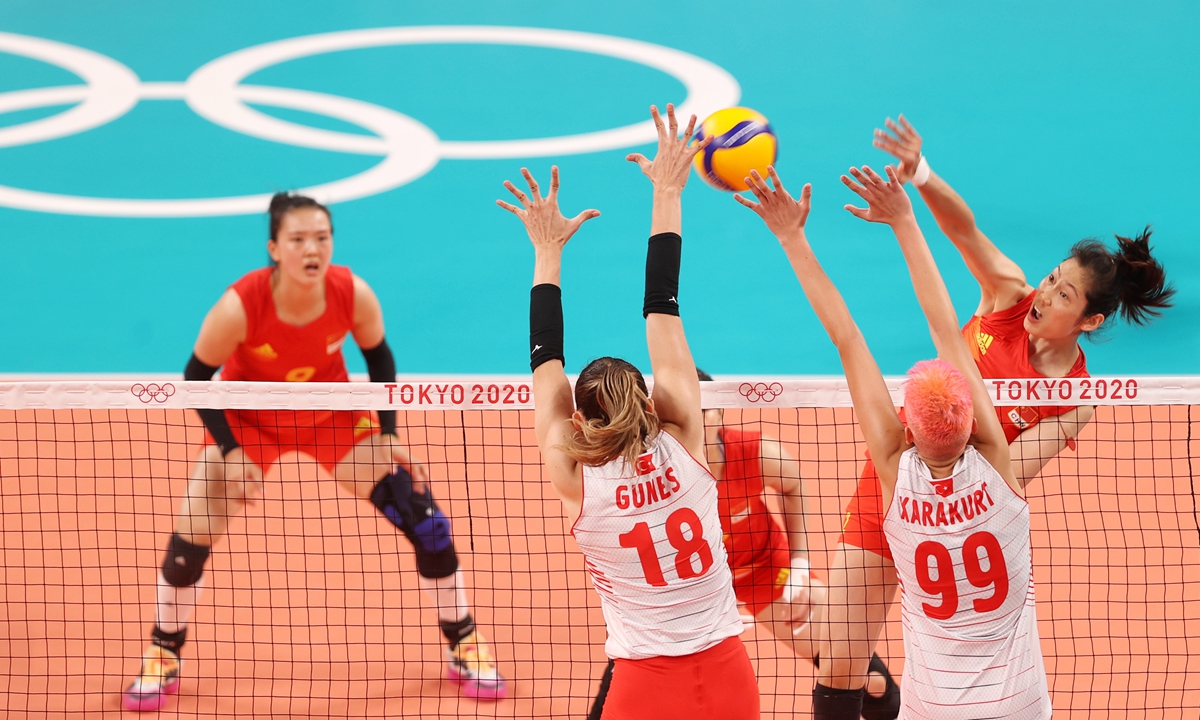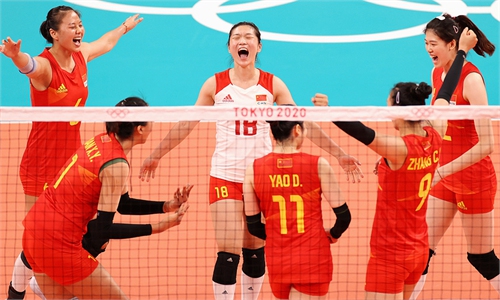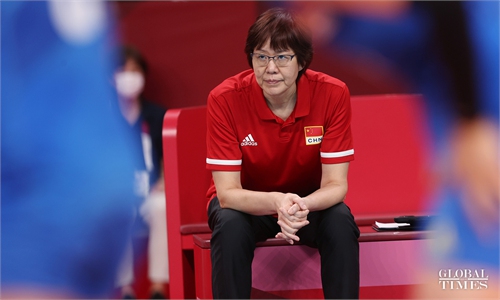SPORT / MISCELLANY
Failure at Olympics a precious experience for captain Zhu Ting
Failure at Games precious experience for captain Zhu

China's Zhu Ting (right) spikes during the match against Turkey at the Tokyo Olympics on July 25. Photo: Cui Meng/Global Times
Perhaps Zhu Ting, captain of China women's volleyball team, has hit the lowest point in her professional career at the Olympics.Injuries mounted, confidence waned, performances dropped. China's ambitions for the title at Tokyo 2020 crumbled with an entirely unexpected ninth-place finish, the worst performance it has achieved this year.
With three defeats in a row, the defending champions were knocked out in astonishing style. Despite two consecutive wins in the last two group games, China failed to climb out of its hole to move into the elimination stage. With a bandaged wrist, captain Zhu was benched in the last two games.
As one of two flag bearers, Zhu led the Chinese delegation into the Olympic Stadium at the Tokyo Games opening ceremony.
Injury concerns
And as captain of the volleyball team, the 26-year-old had been seeking to make China's flag fly high in another way. However, an old wrist injury prevented the spiker from making it happen.
China's opening game set the tone for the rest of the competition, as Zhu's troupe was stunned by Turkey with a 3-0 defeat, in which Zhu only provided a lackluster four points, substantially below her average level.
A picture that went viral after the match showed Zhu's wrist bandaged up with a splint inserted.
It was reported that Zhu's wrist injury resulted from an accident in 2017, and given her busy calendar, she opted for conservative treatment rather than radical surgery.
In the second match, Zhu's conditions improved a little as she pocketed 18 points, but it was not enough as China lost to the United States by another 3-0 scoreline.
"The pain did affect me a lot in the opener, I felt powerless when it hurt," Zhu said after the match.
In the following match against Russia, the injury seemed to still overshadow Zhu's performance, as despite 17 points, she preferred drops over hits, and didn't do well in reception.
Head coach Lang Ping didn't rule out the possibility of resting Zhu after the decisive showdown.
"Zhu is heavily affected by the injury, she hardly hit the ball. We will negotiate with Zhu and the medical staff to consider players who are in better shape," Lang said.
China's slim chance of qualification was dashed ahead of the clash with Italy on July 31 when Turkey dominated Argentina 3-0, so the two remaining matches turned out to be dead rubbers.
Upper echelon
After Lang returned to the China coaching spot in 2013, Zhu was soon called up into the senior national volleyball team and gradually became the team's key player.
Boasting a large frame, the 198-centimeter spiker has the extension to reach a near-impossible heights while also having the dexterity to act swiftly to get down low.
With considerable talent and hard work, the girl from rural Henan Province quickly broke into the world's upper echelon of spikers.
Zhu's first major international competition came in 2014 when she led China to a runner-up finish in the World Championship, before winning the World Cup a year later, following an unforgettable experience to stand on the top of the podium at the 2016 Rio Olympics.
"As captain and figurehead of China's women's volleyball team, the reigning Olympic champions, Zhu is one of the country's biggest stars," wrote Agence France-Presse at the time.
Some have even listed Zhu as one of the best players in volleyball's history, and the comparison to Lang says a lot, but Zhu still keeps a low profile.
"Lang and me are from different eras, which means different requirements, so I still need to learn and do better."
A desire to keep learning is the secret behind Zhu's progress. After the success in Rio, Zhu moved abroad to join Turkish volleyball giants VakifBank Istanbul.
Turkish League, Turkish Cup, Turkish Super Cup, CEV Champions League. Zhu's three seasons overseas saw her collect all manner of titles and awards to add to her cabinet.
Away from volleyball, Zhu also broadened her horizons studying for a Master's degree in history at Beijing Normal University.
"I am interested in history, so I wanted to learn more to enrich myself," she said.
And although the experience in Tokyo ended in disappointment, it will surely be remembered by Zhu as a lesson in how to deal with problems.
As the saying goes, failure is the mother of success. Perhaps the lessons from Tokyo will breed success in Paris in three years' time.


